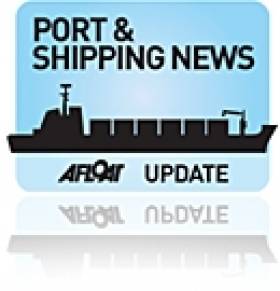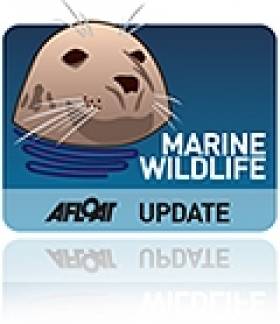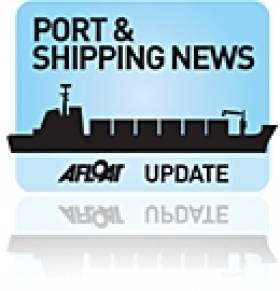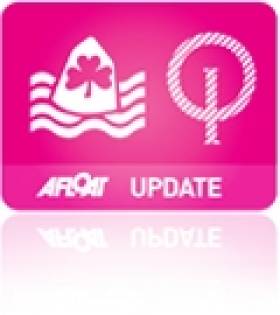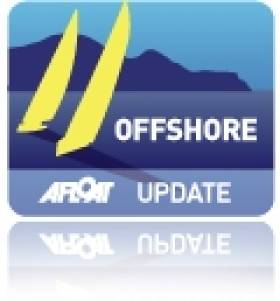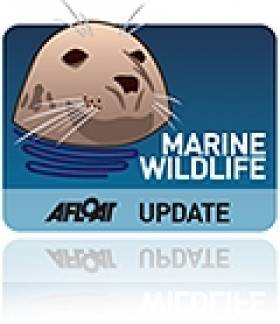Displaying items by tag: New Zealand
New Zealand Port Orders Container-Carriers from Liebherr’s Irish Plant
#ShippingCRANES- Liebherr's Irish based crane plant in Killarney, Co. Kerry, has received an order for four container carriers from Lyttelton, Port of Christchurch in New Zealand, according to Handy Shipping Guide.
The south island port's freight handling facility, saw a box capacity throughput increase of 16.8% to the end of June 2012.
The order for the four staddle-carrier (SC350T) machines are to be supplied with a 50 foot spreader and will join a pair of Liebherr ship to shore cranes at the port already in situ. The cranes will be linked to a remote container tracking system, providing real-time accurate information on the position and handling rates of containers within the terminal.
On the north island, the port of Tauranga had previously ordered three of Liebherr's Irish-built straddle-carriers and once again this latest order followed detailed evaluations by port engineers and drivers during site visits to existing terminals using Liebherr machines.
Christchurch it seems is recovered from the traumatic scenes witnessed during the earthquakes of two years ago and the new cranes are scheduled for delivery from Liebherr in mid-2013.
Surfer Attacked By Shark - And Lives to Tell the Tale
#MARINE WILDLIFE - A Sligo-based surfer has relived the moment when he was attacked by a shark in his native New Zealand.
As the Otago Daily Times reports, 42-year-old Peter Garrett was surfing off Taranaki on North Island on Tuesday when the shark mauled him, leaving 10 bloody wounds - each about 2cm deep - with its razor-sharp teeth.
"He was bleeding quite a bit," said James Bruce, one of two vets surfing in the area who came to his aid. "You could tell from the teeth marks it could've been more serious."
Speaking to the Irish Independent from New Zealand, Garrett said he was knee-boarding at the time when he felt a bump to the board and a sudden sharp pain in his leg.
"I looked down and there was a shark on my leg and I sort of yelled obscenities at it... But it came back and I kicked at it with my flippers."
New Zealand has a relatively high incidence of unprovoked shark attacks, with some 44 on record since the mid 19th century - compared to 39 for the whole of Europe.
The Irish Independent has more on the story, including photos, HERE.
New Zealand Cargo Ship Wreck Breaks Up in Heavy Seas
#SHIPPING - The Greek-owned cargo ship which ran aground off New Zealand three months ago - described as the country's worst maritime disaster - has split in two in heavy seas.
In a scene thankfully avoided closer to home, with the successful tranfer of 54,000 tonnes of vacuum gas oil from the damaged tanker Germar Companion in Belfast Lough, rough conditions off the New Zealand coast have caused the stern section of the Rena to snap off.
As many as 300 containers were washed overboard, polluting the water with milk powder and other debris, and fears are growing of a new oil spill in the coming days posing a threat to marine wildlife.
According to BBC News, hundreds of tonnes of fuel have spilled into the sea since the ship first ran aground at the Atrolabe Reef off North Island on 5 October, causing the deaths of hundreds of seabirds.
Though more than 1,100 tonnes of oil have been removed from the stricken vessel, some 385 tonnes remain aboard.
BBC News has more on the story HERE.
Sophie Drops to 16th After Six Races in New Zealand
#optiworldsnz –Sailing for Ireland, Sophie Browne of Tralee Bay Sailing Club has dropped from 7th to 16th overall after six races sailed at the Optimist World Championships, according to provisional results from organisers this morning. Browne scored a 16th in race six of the 210–boat fleet to place 16th overall. Significantly though the top Irish sallor is on equal points with 14th place and only seven points off the top ten, still very much in contention. Only 10 points separate 11 of the top 16 boats in the fleet with a further discard in hand and everything to play for. It is the first time Ireland has contested the World championships in four years, Irish efforts have been previously concentrated on the European championships.
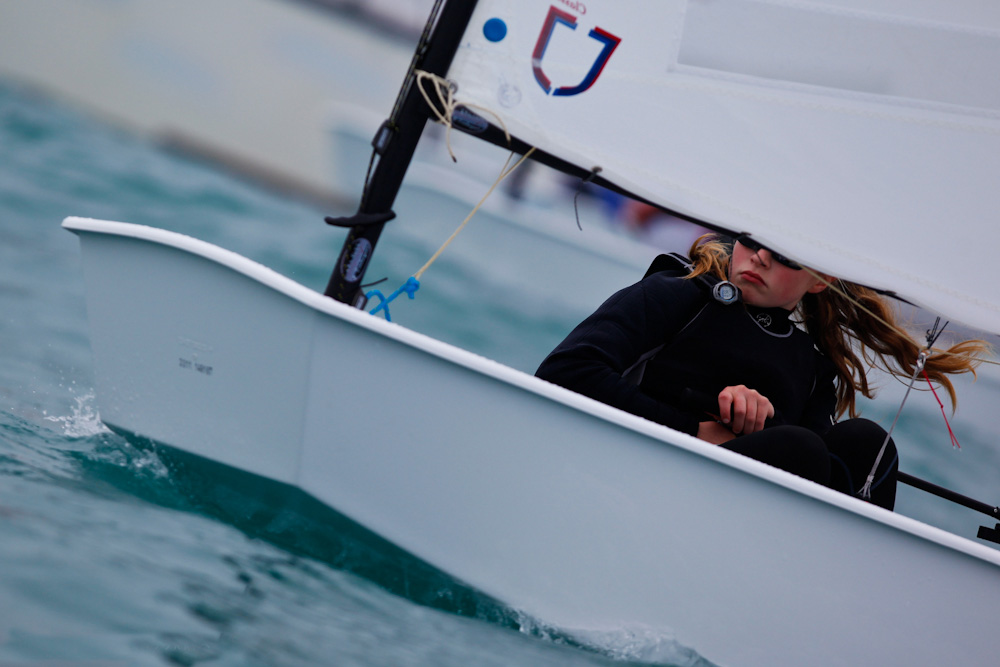
Sophie on day three of the Oppy worlds in Napier. Photo: Matias Cappizzano
Today, the third day of racing at the Optimist World Championships, the breeze was light and variable and when the race officer got proceedings underway it was 5 to 7 knots of wind. Although the conditions did not suit Sophie very much, she has still managed to maintain a consistent performance on a very challenging day for her.
The usual local wind pattern has not materialised in the past few days and the temperature has been lower than usual with rain and cloud cover. The land has not heated up enough to generate sufficient convection to establish a sea breeze.
The wind shifted and dropped making conditions very difficult at times. Sophie had been in 7th place overall on the leader board overnight after 2 days of the event, but despite a difficult start she managed to claw her way back to 12th place at the winward mark and held on to her place to the wing mark, she then improved and gained a few more places on the last beat to the finish line when the wind dropped off further before shifting and favouring the opposite side of the track.
Sophie finished 16th in the only race today and now lies 16th overall for the championship after one discard.
She continues to sail with consistency which may assist her in the overall standings at the end of the regatta. She has placed in the top 20, out of 210 boats competing, in every one of her 6 races so far in this event.
The next two days are for team racing only followed by a lay day and Sophie's next race will be on Saturday when the last 3 days of fleet racing starts.
More results as we have them. Day two vid below where Sophie gets vertiable mention for her strong wind technique.
Velux 5 Oceans: Windy Start to Ocean Sprint 3
The Velux 5 Oceans website has posted a video preview ahead of the third ocean sprint stage in the marathon round-the-world yacht race.
The third stage, which kicks off tomorrow, will take the four competing yachts across the Pacific Ocean from Wellington, New Zealand to Punta de Este in Uruguay.
Sail World reports that northerly gales are expected to buffet the boats from the off as they set out on the incredible 6,000-mile route, which will take them to Nemo Point - the most remote spot in the world - and the notorious challenge of Cape Horn.
American Brad Van Liew, skipper of Le Pingouin, is currently in the lead having won the previous two ocean sprints in the 30,000-mile race.
Post Mortem on Mass Pilot Whale Strandings Cancelled Due to Bad Weather
Plans to carry out a post-mortem examinations on thirty-five Pilot whales found dead on a beach in Co Donegal yesterday have been cancelled due to bad weather according to Dr. Simon Berrow of the Irish Whale and Dolphin Group (IWDG).
Up to thirty-five Pilot whales were found dead on a beach in Co Donegal. The whales were discovered on Rutland Island near Burton port yesterday afternoon on a beach and have been confirmed as pilot whales, mostly mothers and calves.
A team from the Galway-Mayo Institute of Technology led by Dr Ian O'Connor and the Irish Whale and Dolphin Group are planning to travel to record length, gender and obtain photographs to see if they can be matched to the recently observed Scottish animals. Skin samples and teeth will also be collected for genetics and life-history studies.
According to locals the whales had been seen feeding in the area around Aranmore Island since Tuesday.
A group of around 30 pilot whales were monitored in South Uist in the outer Hebrides, Scotland last weekend for fear of their live-stranding. The IWDG believe it may be the same group.
Pilot whales have a tendency to strand themselves in large numbers and a similar incident occurred in Co Mayo a few years ago. In June Cape Verde islanders abandoned hope for the survival of 92 pilot whales that were found washed up in a mass beaching. In September in New Zealand at least 25 pilot whales died after beaching themselves in a north Wellington bay as rescuers battled to save almost 50 more stranded.
RTE News has pictures HERE


























